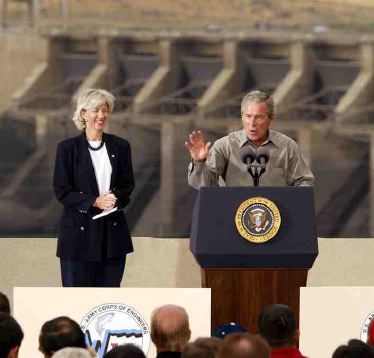forum
library
tutorial
contact

All Parts of Northwest
Have Stake in Salmon
by Joel Connelly, P-I COLUMNIST
Seattle Post-Intelligencer, December 1, 2006
|
the film forum library tutorial contact |

|
All Parts of Northwest
by Joel Connelly, P-I COLUMNIST
|
In the gorgeous headwaters country of Idaho's Salmon River, just below Redfish Lake, a weir is transformed each summer into an environmental shrine with burning candles, artists' drawings and suggestive signs.
"Spawn Your Brains Out!" said a handwritten missive when I last visited, along with "Spawn Until You Drop."
Thousands of returning sockeye salmon used to give Redfish Lake its name. In recent years, between one and four sockeye have negotiated the 800-mile plus journey up past eight Columbia and Snake River dams.
"Idaho Has Habitat -- Needs Salmon," ex-Gov. Cecil Andrus suggested as a polite slogan.
The Salmon River runs wild and undammed from its headwaters to its spectacular Hells Canyon confluence with what President Bush in 2000 called "the river on the Snake."
As Republicans prepare to relinquish control in Congress, all corners of the Northwest may be called upon to defend this distant place. If salmon aren't your cause, there's a case for defending the rule of law.
Sen. Larry Craig, R-Idaho, may use the lame duck session to insert one of those legislative "riders" favored by the adversaries of environmental protection.
In this case, should Craig act, the rider would uphold the administration's plans for Columbia and Snake River dams, which have been rejected by a judge because they don't prevent the extinction of salmon.
U.S. District Judge James Redden, based in Portland, has spent six years presiding over the contentious, stalled federal effort to come up with a plan to restore salmon runs on the Columbia-Snake River system.
Redden is as a strict constructionist. He has shown patience waiting for a political solution, but believes that Congress meant what it wrote in the Endangered Species Act.
The Bonneville Power Administration, which markets electricity from federal dams, sought to stop spilling water over dams each spring. The BPA loses power revenue from the spill, but it helps young salmon pass to the Pacific Ocean.
Redden ruled against the BPA. It has appealed to the 9th U.S. Circuit Court of Appeals.
 The Bush administration has tested his patience. In one opinion, Redden wrote that agencies "have repeatedly and collectively failed to demonstrate a willingness to do what is necessary" under the Endangered Species Act to save salmon.
The Bush administration has tested his patience. In one opinion, Redden wrote that agencies "have repeatedly and collectively failed to demonstrate a willingness to do what is necessary" under the Endangered Species Act to save salmon.
He has decried proposed Bush salmon plans as "more cynicism than sincerity."
The judge has upbraided a powerful alphabet's soup of bureaucracies: the U.S. Bureau of Reclamation, the Army Corps of Engineers, the Bonneville Power Administration and the National Oceanic and Atmospheric Administration.
Redden has even taken on the big federal projects that irrigate 2 million acres in southern Idaho. The judge ordered the Bureau of Reclamation and NOAA Fisheries to consider the effects of upper Snake River irrigation on salmon migration through dams downstream in Washington and Oregon.
He wrote in September that agencies "seem to be more concerned with ensuring" that upstream Idaho irrigators get water for crops than in mitigating damage done to endangered salmon by dams and diversions.
Redden is, of course, right.
Candidate Bush made defense of four federal dams on the Snake River a centerpiece of his 2000 campaign. The president put in a much-publicized appearance at Ice Harbor Dam near Pasco to argue that salmon restoration can work without breaching the dams.
The Bush administration has allied itself with irrigators, upstream navigation interests and timber producers in the West's land-use battles.
Bush political guru Karl Rove became involved in the struggle between farmers and fisheries' interests in the Klamath Basin of Oregon.
Respect for legal restraints, and legal procedures, isn't a strong suit of this administration.
 The result is best summed up in a Washington Post headline from early October: "Bush Policy Irks Judges in West."
The result is best summed up in a Washington Post headline from early October: "Bush Policy Irks Judges in West."
U.S. District Judge Charles Breyer ruled last summer that the "Forest Service's interest in harvesting timber has trampled" environmental laws as the federal agency drew up plans to manage California's Giant Sequoia National Monument.
A U.S. magistrate, Elizabeth Laporte, has largely reinstated a Clinton administration rule that barred construction of logging roads over 58 million acres of land in the West. The "roadless rule" was unilaterally changed, she wrote, without regard to endangered species or justification of abandoning management rules that were years in the making.
U.S. District Judge Donald Molloy, based in Montana, recently took the U.S. Fish and Wildlife Service to task for ignoring "substantial scientific information" in choosing not to investigate whether the wolverine is in danger of extinction.
Activist judges? Quite the opposite: What's happening is application of checks and balances to a runaway administration.
Craig has struck once. He used a federal spending bill last year to effectively delete the budget of the Fish Passage Center in Portland, whose fish counts provided data to back up Redden's rulings.
If another rider slides by, Idaho would be off the hook when it comes to helping salmon recover. Washington and Oregon would be forced to bear an increased burden.
And the fish would continue to disappear from the Northwest's master river system.
Related Sites:
Senator Craig's previous rider withdrew funding from the Fish Passage Center which provides Pertinent Data including:
Adult Salmon Return Comparison - compares current year to last year and the ten year average.
Adult Salmon Passage at Lower Granite Dam Yearly Adult Counts 1975 - Present
learn more on topics covered in the film
see the video
read the script
learn the songs
discussion forum
